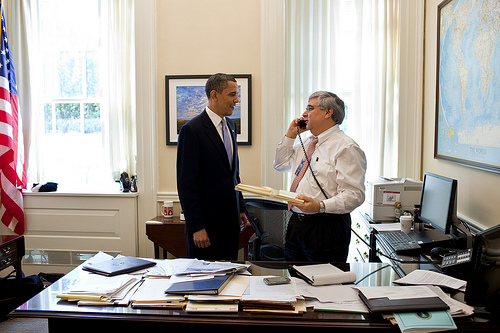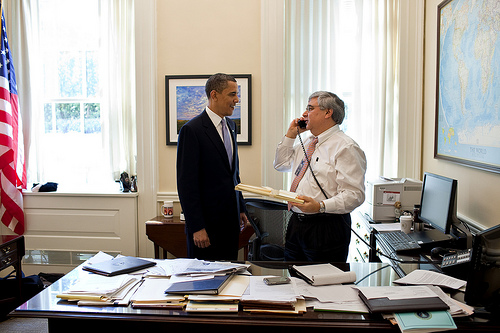 Interim chief of staff Pete Rouse with ObamaPhoto: White HouseRahm Emanuel is out, resigning as White House chief of staff to run for mayor of Chicago. Pete Rouse is in, stepping into the powerful role (at least through the end of the year) after an influential career as chief of staff to Senate Minority Leader Tom Daschle (D-S.D.), then to Sen. Barack Obama, then as senior advisor to President Obama.
Interim chief of staff Pete Rouse with ObamaPhoto: White HouseRahm Emanuel is out, resigning as White House chief of staff to run for mayor of Chicago. Pete Rouse is in, stepping into the powerful role (at least through the end of the year) after an influential career as chief of staff to Senate Minority Leader Tom Daschle (D-S.D.), then to Sen. Barack Obama, then as senior advisor to President Obama.
Climate types won’t miss Emanuel. More than any other White House staffer (except Obama himself), Emanuel gets blamed for the president’s hands-off approach to energy legislation, which allowed professional climate deniers to define the debate over “cap-and-tax” and “light-switch taxes.”
Journalist Eric Pooley, who reported on White House climate strategy for his book The Climate War, argues that Emanuel never saw climate as a moral or ethical issue — or even as a political winner:
What he cared about was winning — acquiring and maintaining presidential power over an eight-year arc. Climate and energy were agenda items to him, pieces on a legislative chessboard; he was only willing to play them in ways that enhanced Obama’s larger objectives. He saw no point in squandering capital on a lost cause.
Emanuel was seen as a driver of Obama’s decision to govern through “transactional politics” — cutting deals and working within accepted constraints — rather than “transformational politics” — trying to change what’s considered possible, in line with the hope and change themes (remember those?) of Obama’s campaign.
Rouse is another insider/pragmatist. He’s built a career on working within the limits of Washington, running Daschle’s office for 19 years, then helping acclimate Obama to the halls of Congress. His record suggests he’ll support the White House’s continued deference to Congress in writing energy bills.
But he knows his energy and climate policy. Rouse’s time in Daschle’s office put him in the scrum of key energy battles of the ’90s and early aughts. He put the freshman Sen. Obama in touch with experts on biofuels and energy security to help him get up to speed. And he cares about the stuff, according to Eric Washburn, who worked with him as Daschle’s legislative director for 10 years.
“Pete’s a pretty progressive guy in his heart,” said Washburn, who now lobbies for solar, nuclear, and gas companies. “He feels pretty strongly about not just environmental stuff and climate change, but health care too. The thing that distinguishes Pete is that he’s, more than anything, a political pragmatist.”
And he’s played defense in tough spots before. Rouse helped ward off attacks on regulation from a new Republican majority in 1995, such as the Dole-Johnston bill that would have dismantled environmental safeguards. That could prove to be relevant experience if Republicans take over one or both houses of Congress in November and launch a new wave of assaults on environmental protection. They have already signaled they’ll try to strip the EPA’s authority to regulate greenhouse-gas pollution (with the help of Democrats like Sen. Jay Rockefeller (W.Va.), and they may take aim at limits on mercury, sulfur, and other pollutants as well.
Such provisions could reach the president’s desk attached to larger spending bills, forcing Obama to choose between accepting some provisions he doesn’t want or vetoing something that he does. The chief of staff will help make that decision.
“Pete has a lot of experience defeating bad ideas,” said Washburn. “Some of the most important things he does, environmentally, may be to help the Obama administration strategically think through [how to protect the EPA from Congress].”
Rouse may be a friend of the filibuster. The Senate’s perverse rules that require 60 votes to do nearly anything prevented climate legislation from passing in the last two years. But those rules can also prevent backsliding, as Rouse knows from his time working for Daschle when Democrats were in the minority. That experience — and the fact that Congress may offer more harmful than helpful legislation on climate next year — make Rouse unlikely to support the Senate rules reform that some progressives are calling for.
Using the filibuster to prevent EPA-neutering amendments could keep Obama out of difficult situations. Rouse’s intimate knowledge of Congress would be an asset in that fight.
“He knows the Senate probably better than anyone in the White House, including the president,” said Daniel J. Weiss of the center-left Center for American Progress Action Fund. “He’s a very, very smart and politically savvy person … If there is an opening, Pete Rouse can help find it and take advantage of it.”



